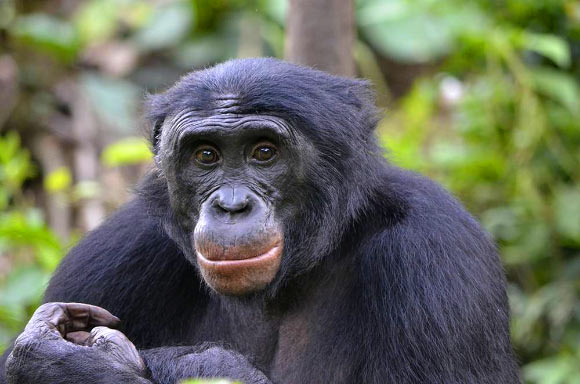While humans generally prefer individuals who are nice to others, a new study finds bonobos (Pan paniscus) — our closest relatives in the animal kingdom along with chimpanzees — are more attracted to jerks. Duke University scientists Christopher Krupenye and Brian Hare were surprised by their findings because bonobos have been shown to be less aggressive than chimpanzees.

Fizi, an adult male bonobo at Lola ya Bonobo Sanctuary in the Democratic Republic of the Congo. Image credit: Christopher Krupenye, Duke University.
“We were surprised in that many have characterized bonobos as being the most cooperative, ‘hippie’ ape. Our experiments show that the issue is much more nuance,” Krupenye said.
“Bonobos are highly socially tolerant in food settings and help and cooperate with food in ways that we don’t see in chimpanzees. However, dominance still plays an important role in their lives.”
The findings suggest that humans’ preference for helpers evolved only after our species diverged from other apes.
“This preference may have provided the foundation for the development of more complex features of human cooperation,” the study authors said.
“The evidence also suggests that bonobos might prefer hinderers because they see them as more dominant. In primate society, it pays to be dominant and have dominant allies.”
The new study was inspired by an earlier study reported in 2007. It showed that young human infants already prefer helpers.
“It was striking and unexpected and suggested that these sorts of motivations may be really central to humans’ unusually cooperative nature,” Krupenye said.
In the new study, he and Dr. Hare wanted to find out whether the motivation to prefer helpers might be unique to humans.
They studied adult bonobos at Lola ya Bonobo Sanctuary in the Democratic Republic of Congo.
In one series of trials, the team showed 24 bonobos animated videos of a Pac-Man-like shape as it struggles to climb a hill. Then another cartoon shape enters the scene. Sometimes it’s a helpful character who gives the Pac-Man a push to the top, and other times it’s an unhelpful one who shoves him back down.
Afterwards, the scientists offered the bonobos two pieces of apple, one placed under a paper cutout of the helpful character and another under the unhelpful one, and gauged the bonobos’ preference by watching to see which one they reached for first.
In another experiment, the bonobos watched a skit in which a human actor drops a stuffed animal out of reach. Then another person tries to return the toy to its rightful owner, but before they can a third person snatches it away. Afterwards, the bonobos choose whether to accept a piece of apple from the do-gooder or the thief.
In each experiment, the bonobos were able to distinguish between helpful and unhelpful individuals just like humans can. But unlike humans, most bonobos tended to choose the jerks.
The researchers also measured the apes’ baseline preferences for each of the people in the stuffed animal skit at the beginning of the experiment, before the drama with the toy unfolded. The bonobos liked the mean people even more after they started behaving badly.
“There may be a good reason for these puzzling results,” they said.
“It could be that bonobos interpret rudeness as a sign of social status and are simply trying to keep dominant individuals on their side. In other words, it pays to have powerful allies.”
To test the idea, the authors showed 24 bonobos another set of animated videos in which one cartoon character repeatedly prevents another one from claiming a coveted spot.
The apes generally preferred the character who hogged the spot over the one who yielded.
“For bonobos, schmoozing with dominant individuals could mean better access to food, mates or other perks, or less chance of being bullied themselves,” Krupenye said.
“We continue to explore social preferences and social evaluation in bonobos, trying to understand what types of social information they track and what motivates their preferences,” he added.
“We also plan to conduct similar studies in chimpanzees.”
The research appears in the journal Current Biology.
_____
Christopher Krupenye & Brian Hare. Bonobos Prefer Individuals that Hinder Others over Those that Help. Current Biology, published online January 3, 2018; doi: 10.1016/j.cub.2017.11.061







